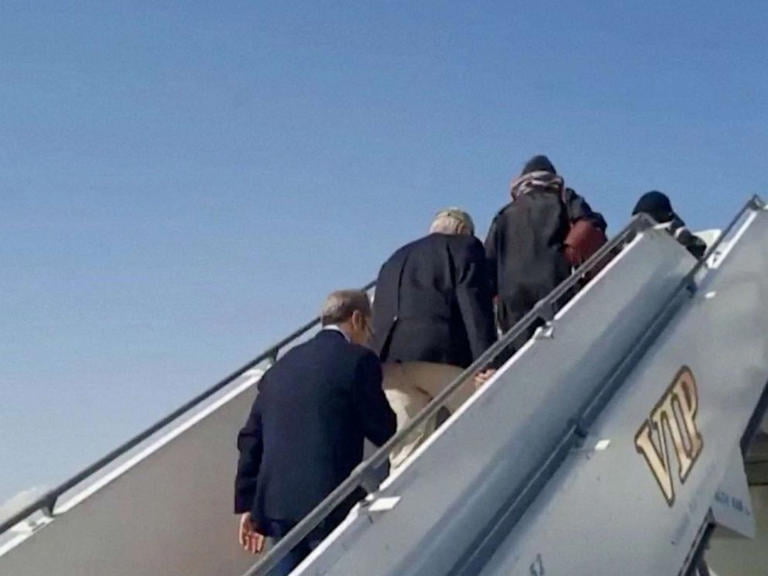Americans Wrongfully Detained in Iran Return to the United States

In a heartwarming turn of events, five Americans who endured years of wrongful imprisonment in Iran have finally returned to U.S. soil, evoking strong emotions on Tuesday. This remarkable journey of freedom marks a significant moment in their lives and the diplomatic relations between the two nations.
A Joyous Reunion
A military airfield near Washington, D.C., witnessed an emotional reunion when a plane carrying these five resilient Americans, accompanied by two of their family members, touched down at 5.25 a.m. ET. Their journey had begun in the Gulf state of Qatar, which played a crucial role in facilitating their release.
A Prisoner Exchange of Global Significance
This heartening homecoming was made possible through a prisoner exchange agreement that not only secured the freedom of these wrongfully imprisoned Americans but also allowed Tehran to access $6 billion in oil revenues frozen under U.S. sanctions. In return, five Iranian nationals were released from U.S. custody, highlighting the complexity and significance of this diplomatic negotiation.
Amidst Tensions, a Glimmer of Hope
It is important to note that this remarkable diplomatic achievement transpired amid heightened tensions between the United States and Iran, stemming from various contentious issues, including Iran’s uranium enrichment program and its domestic crackdown on dissent. Just a year ago, the tragic death of Mahsa Amini had sparked a wave of unrest within Iran. Despite these challenges, the spirit of diplomacy prevailed, leading to the emotional scenes witnessed on the tarmac.
Tears of Freedom
As the plane door opened, and the freed Americans stepped onto U.S. soil, there were tears of joy and relief. Family and friends eagerly awaited their loved ones, many waving small U.S. flags as they tearfully embraced. These heartfelt reunions captured the essence of their struggle and resilience.
A Pledge to Make a Difference
Roger Carstens, the special presidential envoy for hostage affairs, expressed the collective sentiment, stating, “We’ve all looked forward to this day.” He added that the group remains committed to “maintaining the fight” to secure the release of other detained Americans, symbolizing their unwavering determination.
Profiles of Resilience
Let’s take a moment to recognize the extraordinary individuals who have endured these trying years:
- Siamak Namazi (Age 51): Siamak Namazi, the longest-serving among the five American prisoners, endured almost eight years of captivity. He was arrested in 2015 on espionage charges and subjected to a trial that lasted only a few hours.
- Emad Shargi (Age 59): An Iranian-born businessman who had moved to the United States as a young man, Emad Shargi was arrested in 2018. Despite being released and cleared of all charges in 2019, Iranian authorities retained his passport. He was charged again in 2020 and convicted of espionage without a trial.
- Morad Tahbaz (Age 67): Morad Tahbaz, an Iranian-American with British citizenship, was part of an environmental activist group conducting research on Iran’s endangered cheetah population. In 2018, he was arrested and subsequently convicted of espionage in 2019.
Anonymity Preserved
The families of the two other former prisoners have chosen to keep their identities private, a decision respected by U.S. officials.
Advocacy for Human Rights
Human rights groups have consistently accused Iran of baselessly charging these prisoners with espionage. Iran, however, maintains that they were treated in accordance with the law. This discrepancy underscores the importance of diplomatic efforts to secure the release of those wrongfully detained.
Diplomatic Context
This remarkable event unfolded as President Joe Biden and Iranian President Ebrahim Raisi were set to attend the annual United Nations General Assembly in New York. The agreement reached has not been without its critics, particularly from Republicans who argue that it amounts to a “ransom” payment, potentially encouraging Tehran to imprison more foreigners.
A Humanitarian Commitment
The Biden administration, however, has emphasized that the unblocked funds will be strictly used by Iran for essential purposes such as medicine, food, and other humanitarian needs. This commitment reflects a nuanced approach to diplomacy, aiming to balance international relations and human rights concerns.
The emotional homecoming of these five Americans is a testament to the power of diplomacy and the resilience of the human spirit. Their journey reminds us that even in the face of adversity, hope, and determination can lead to freedom. As the world watches, it is our hope that this event will pave the way for more diplomatic breakthroughs and the safe return of others wrongfully detained.




